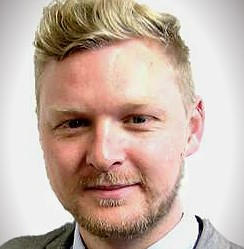Contact: richardshaw12002@gmail.com
- How did you get into teaching?
It all started when I decided to move to Budapest, Hungary, in 2009 without much thought about what I really wanted to do, so I thought I would try my hand at teaching English until I found a “proper” job. Through teaching a variety of courses in my first couple of years, from middle managers to infants, I realised that I really enjoyed the interpersonal nature of the job and that teaching also enabled me to learn a great deal about different industries and how language works in the way it does.
- Who did you teach in Hungary and how does the teaching environment compare between here in there?
When I first arrived in Budapest, I worked at the language school Katedra Nyelviskola as a freelance trainer mainly teaching one-to-one Business English to middle managers in mid-sized companies. Rather than the usual once a week we have here in Berlin, I would see my students/clients twice a week. There was more emphasis on following coursebooks there than in Berlin. There are also obvious differences in the manner that Hungarians use English in comparision to German users, for example, the word order they use and pronunciation differences. Later on, I started teaching children which was really enjoyable and a nice change from teaching adults.
- What’s your main focus when it comes to teaching?
My focus is on facilitating learning rather than teaching when it comes to language acquisition. Through careful and structured planning, I believe that the teacher should ‘step back’ a little more in the classroom/learning environment, giving the students the reins and promoting learner autonomy in order to discover and process the language deeper through meaningful usage and exploration.
- What did you learn from your time in academic management?
I worked as ADoS for Meridian School of English Portsmouth and Plymouth simultaneously, one in-house and the other remotely, organising teachers, students, and courses. Planning and running a series of different courses at each location, discussing timetabling of trainers, and designating tasks to people of trust was only really achieved, in my opinion, with the value of clear and concise communication, patience and listening to people, and having the right team.
- Can you tell us more about the 2-week teacher training course you did in the Philippines?
In brief, in 2016, a small team of three teacher trainers, including myself, were asked to go over and conduct a teacher training course in a small school made from upcycled shipping containers in the ‘Smoky Mountain’ shanty/slum area in Manila, and again in 2017. I could really write pages on my experience there, but I can honestly say it was a life changing experience. The people there are just incredible, from all walks of life, from the top to the ‘bottom’ let’s say. The teachers we were training and the accompanying staff of the school were just amazing and have the biggest hearts.
In terms of the training, firstly, we set up a series of teacher observations to note down pedagogical areas that could be addressed and then produced a training plan with workshops and ‘round table’ discussions every day in order for the teachers to gain extra skills to add to their teaching arsenal and improve their general pedagogical competence.
- What did you learn from your experience teaching in such a different environment (in the Philippines)?
There certainly was a difference in conducting teacher training with a small number of your peers that you know very well to training a group of 20-odd people who have only just met in an unfamiliar country, while mostly jetlagged (for the first few days at least!). I learned that although a lot of teaching techniques / activities / ideas can be transposed into other contexts, not everything can, and not everything is relevant across the board. Ideas that the training team initially had in the meetings before our trip and when we observed the trainers were soon dropped in favour of other ideas which were more appropriate to the teachers we were training.
- Do you have a favourite topic to teach (pronunciation, debate, EAP….)?
It’s early days at the moment as I’m only in my second semester at the University of Potsdam, but I think so far the most interesting subject has been pronunciation because it makes me delve back into the areas I touched upon in my degree, especially in areas of phonology and general linguistics. However, I’m really enjoying teaching debate this semester: the students in the class are very bright and switched on and have very interesting points of view.
- What was your main focus in your MA?
During my MA, I consciously tried to delve into as many areas as I could, however, I did have a particular interest in task-based learning, or more specifically, blended task-based learning approaches with a particular focus on teaching English for business purposes. My dissertation focussed on the repetition part of the task cycle and tested whether repeating a task a second time in a given timeframe would improve grammatical complexity, accuracy, and/or fluency (CAF).
- How did doing an MA in applied linguistics support your teaching?
Doing the MA provided me with the pedagogical knowledge and contextual background that underpins the current approaches we take when teaching English, or any language to some extent. It has also enabled me to be able to really assess and evaluate what I do when planning activities, lessons, and courses/curriculum so I am more aware of what needs to be included to ensure the students get the most out of their language courses that they possibly can.
- Who would you like to nominate as Eltabber of the month and what question would you like to ask them?
I would like to nominate Stephanie Anderson and ask her what motivated her to take on the role of blog editor for Eltabb?
Edited by Mandy Welfare

